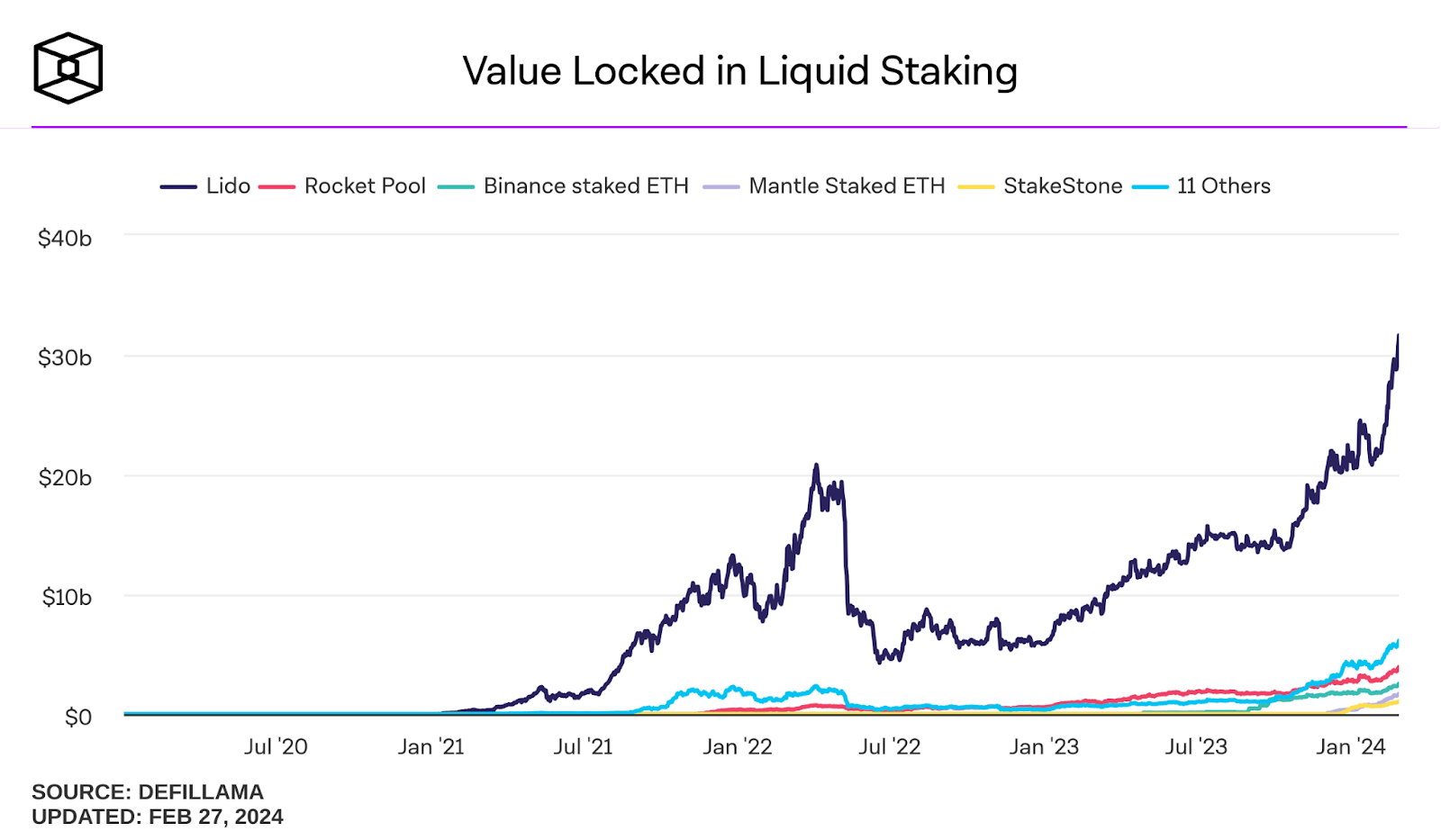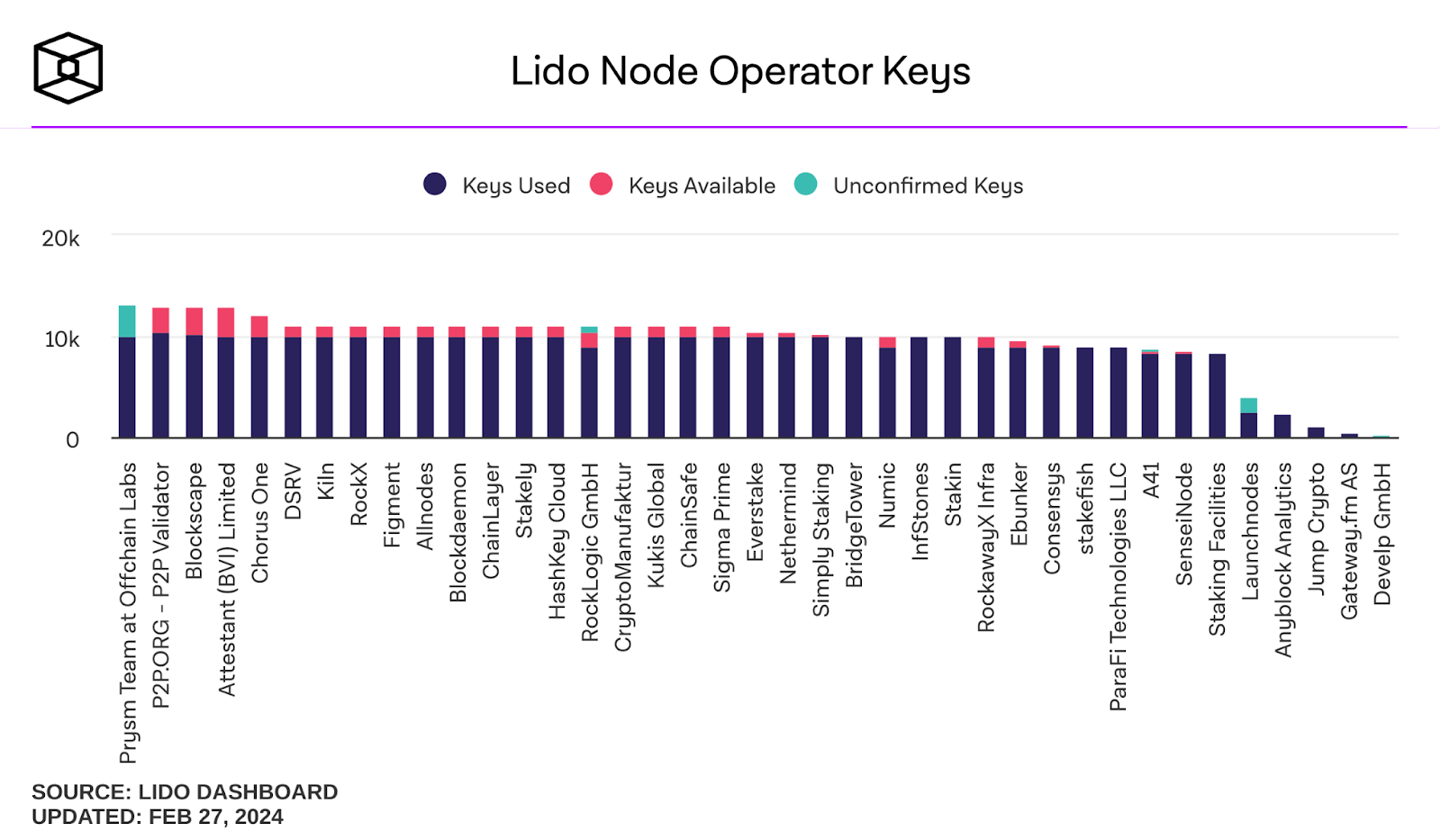Lido Finance, the most famous Ethereum dapp and undisputed leader in the liquid staking sector, yesterday surpassed the $30 billion threshold in Total Value Locked (TVL).
This metric indicates the overall value of assets locked within a dapp or a chain, and studying its trend can be useful to see where capital is moving within the web3 world.
The growth of Lido scares Ethereum supporters, who see a potential risk of centralization of the network consensus: however, the new trend of restaking could limit Lido’s absolute dominance by creating a broader and more decentralized market.
All the details below.
Summary
Ethereum dApp: Lido surpasses $30 billion in TVL and expands the liquid staking sector
The liquid staking sector seems to continue unabated growth, with Ethereum’s flagship dapp, Lido Finance, setting another record and surpassing 30 billion dollars in Total Value Locked (TVL).
According to the on-chain research company The Block, on February 26th Lido reached a locked capital value never achieved before by any existing dapp, closing the day at 30.66 billion dollars.
Today, thanks to the latest rally in the price of ETH, the protocol records a TVL of 31.7 billion dollars.
From July 2022 onwards, following the great depression created by the collapse of the stablecoin UST and the Terra Luna project, Lido has recorded a steady growth in the adoption of liquid staking, gradually expanding its presence in the crypto market
However, after the Shapella update of the Ethereum blockchain, which enabled withdrawals of ether previously staked on the Beacon Chain, the upward trend in Lido’s TVL has seen a substantial acceleration
From May 2023 to today, in about 10 months, approximately $19.3 billion in value has been added

Lido has become so popular among Ethereum dapps, representing alone 63% of all funds locked on it, ahead of the historic MakerDAO protocol that controls 17.8% of the market share. MakerDAO
Even within the niche of liquid staking, Lido holds a position of relevance, as it is well above the second decentralized application in this ranking, Rocket Pool, which currently has a TVL of 3.8 billion dollars.
By now this protocol, celebrated as an institution in the context of decentralized finance, has become the largest validator on the proof-of-stake Ethereum blockchain, controlling 32% of the ether in staking.
Anyway, although it represents a single entity, Lido in turn controls 36 different operators that run nodes and manage the delicate phase of block production within the world’s most famous smart contract blockchain.

Restaking as a new solution to counter the risks of centralization of Lido
As Lido becomes increasingly important as a reference dapp in the liquid staking sector of Ethereum, concerns within the community are also growing in the face of evident risks of centralization of the consensus market.
Already in August 2023 among the main providers of liquid staking solutions, such as Rocket Pool, Stader Lads, Diva Staking and Puffer Finance, there was talk of joining forces and making a pact that unequivocally established that none of them could ever control more than 22% of the market.
Although this coalition has gone down in history as one of the first occasions in which a group of dapps set a hard cap for their TVL, Lido has continued to grow without paying too much attention to its competitors.
In June of the same year, at Lido’s house, this “issue” was discussed, leading to the polls among participants in the governance of the project to establish whether to introduce threshold limits to the protocol’s power: the result is that 99.81% of LDO token holders (those with voting power) voted against imposing any limits.
It will certainly not be collective common sense that can change the cards on the table, now that the protocol is reaching giant dimensions and there are several billion dollars at stake.
Anyway, there is a new trend that could limit the uncontrolled expansion of Lido: we are talking about restaking, which is the practice of reusing the consent offered by Ethereum with previously locked ether.
Platforms like Eigenlayer, a top-tier dapp for the restaking sector, are attracting a significant amount of capital, contributing to the decentralization of network sequencers and therefore also to the overall decentralization of Ethereum.
As of today Eigenlayer controls a TVL of 8.81 billion dollars, ranking as the 3rd dapp by locked value behind Maker and Lido, and actually represents the only piece of the web3 world capable of creating the conditions for a real slowdown of Lido’s power.
With several options on the table to restake with this protocol, and the need to find the highest yield or farm airdrops as much as possible, Lido no longer serves as the only solution on the market but integrates with the rest of the emerging protocols, which are gradually diversifying and decentralizing the various network operators.
 en.cryptonomist.ch
en.cryptonomist.ch
